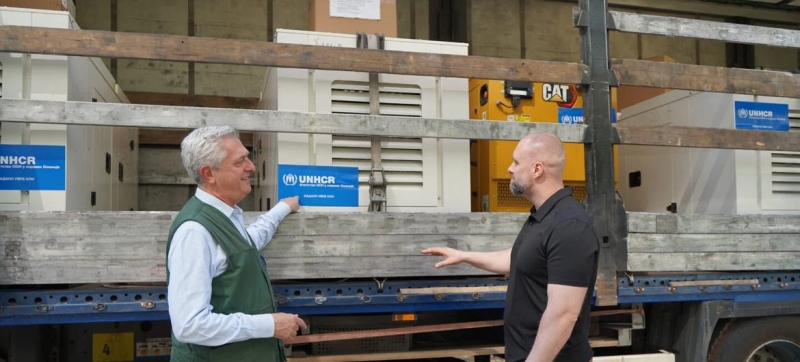
During his visit, Filippo Grandi handed over ten generators to the Ukrainian authorities. UN High Commissioner for Refugees calls on the world to help Ukrainians survive the third winter of the war Humanitarian assistance
UN High Commissioner for Refugees Filippo Grandi, visiting Ukraine, announced an additional $100 million to help war-affected Ukrainians survive the third winter of the war.
Help to Kharkov
The High Commissioner and head of the UN Refugee Agency (UNHCR), Filippo Grandi, stated this while speaking in Kharkov at a meeting on the energy situation. It was chaired by the head of the Kharkov regional state administration Oleg Sinegubov. This is Grandi’s fifth visit to Ukraine after the escalation of the war in February 2022 and the third to Kharkov.
Recall that Kharkov received about 200 thousand internally displaced persons, including many recently evacuees from front-line settlements. The UN refugee agency is concerned that conditions in Kharkov could become even more difficult as winter approaches, forcing many people to seek safety elsewhere.
“Kharkov occupies a special place in our efforts to support the people of Ukraine. I have seen first-hand the impact of ongoing attacks on Ukraine’s energy infrastructure and their impact on millions of civilians. But I have also witnessed the tireless efforts of reconstruction and restoration, which is further proof of the strength and resilience of the government of Ukraine and its people,” said Filippo Grandi, speaking in Kharkov. “We can’t take this for granted.” International support remains critical to help the people of Ukraine and show them our continued solidarity.”
Preparing for winter
To prevent further displacement and keep homes safe and warm, UNHCR has launched a comprehensive response plan for next winter. These efforts were part of a broader UN plan to help Ukrainians. These include providing cash to the most vulnerable, insulating and repairing homes before the cold weather sets in, and helping pay energy bills.
During his visit, Grandi, in coordination with the Ukrainian Ministry of Energy, donated ten generators to regional authorities as an initial contribution to the government’s efforts to provide alternative energy sources and maintain critical services.
“We are grateful to UNHCR for providing generators to seven communities in the Kharkov region. This equipment is intended for critical infrastructure facilities in cities and villages and is extremely necessary in a situation where electricity is supplied intermittently. The support of international partners will help ensure energy stability and security for communities during these challenging times. Thank you for your help to the residents of the Kharkov region,” said Oleg Sinegubov, head of the Kharkov regional administration.
“This support helps us resist Russian terrorist attacks on our energy infrastructure,” said Svetlana Grinchuk, Deputy Minister of Energy of Ukraine. “Such assistance will strengthen our energy system in order to better prepare for the autumn-winter period and get through the heating season. We are working to restore all the equipment that will be possible, but backup energy sources will certainly ease the situation for residents of the Kharkov region.”
The situation in the Kharkov region has worsened in May due to a new ground offensive by the Russian Armed Forces. More than 10,000 people from front-line settlements were evacuated to Kharkov. Together with its non-governmental organization partners, UNHCR is providing assistance to evacuees. People receive financial resources, basic necessities, legal and psychosocial assistance, as well as support to improve living conditions in places of placement.
UNHCR Assistance
In 2022 and 2023, UNHCR and partners helped more than 258,000 people in the Kharkiv region, and since the beginning of 2024, more than 109,000 have provided a variety of essential services to residents of the region, including cash, psychosocial and legal assistance assistance and home repairs. In addition, UNHCR is providing support to 37 collective accommodation sites, including those that have received new evacuees in recent months. This was made possible thanks to the generous support of UNHCR’s largest donors in Ukraine – the United States of America, the European Union, Norway, France and Japan.
